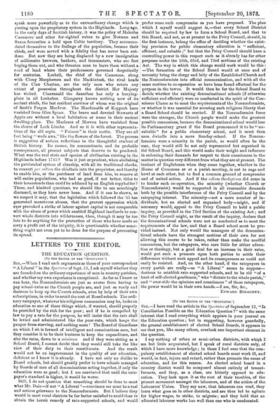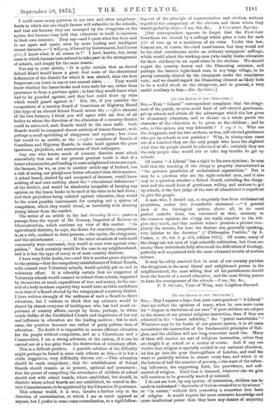[TO THE EDITOR OF TEE "SPECTATOR.")
SIR,-I have read the article in the Spectator of September 13, "Is Conciliation Possible on the Education Question ?" with the same interest that I read everything which appiars in your journal on the Education question ; but in suggesting, however guardedly, the general establishment of elected School Boards, it appears to- me that you, like many others, overlook one important element in the question.
I say nothing of urban or semi-urban districts, with whiph am but little acquainted, but I speak of rural districts only, of sihich I have more knowledge ; in these I feel sure that the com- pulsory establishment of elected school boards must work ill, and would, in fact, injure and retard, rather than promote the cause of education, and for this reason. An elected school board in a country district would be composed almost entirely of tenant- farmers, and they, as a class, are bitterly opposed to edu- cation. They look upon it as the root of their troubles, of the present movement amongst the labourers, and of the action of the Labourers' Union. They say now, that labourers can read, they- learn what goes on in other districts, and are thus led to agitate for higher wages, to strike, to migrate ; and they hold that as educated labourer works less well than one who is uneducated.
I could name many parishes in my own and other neighbour- hoods in which not one single farmer will subscribe to the schools, and that not because they are managed by the clergyman or the squire, but because they hold that education in itself is injurious to their own interests. They say—and I quote what has been said to me again and again, even by more leading and intelligent tenant-farmers, —" I will pay, if forced by Government, but I never !lice; I know what it all conies to ?" I have known, too, many cases in which farmers have refused to take part in the management of schools, and simply for the same reason.
You say in your article, "It is quite certain that an elected School Board would know a great deal more of the educational deficiencies of the district for which it was elected, than the best Inspectors can learn in one or two annual visits. . . . They would know whether the lesson books used were unfit for use, either from ignorance or from a partisan spirit ; in fact they would know what had to be guarded against, and they best could draw up rules which would guard against it." But, Sir, if you consider the composition of a country Board of Guardians or Highway Board (the type of an elected School Board, minus the ex-officio element of the two former), 1 think you will agree with me that of all bodies to whom the direction of the education of a country district could be entrusted, such Boards would be the most unfit. Such Boards would be composed almost entirely of tenant-farmers, with perhaps a small sprinkling of clergymen and squires ; but these last would be as unable, as the ex-officio members of Boards of Guardians and Highway Boards, to make head against the gross ignorance, prejudices, and narrowness of their colleagues.
Any one who knows much of country districts must admit sorrowfully that one of our present greatest needs is that of a better education for, and leading to more enlightened views amongst, the farmers, for we, as you in another article say of Ireland, run a risk of seeing our ploughmen better educated than their masters. A school board, elected by and composed of farmers, would know nothing of and care nothing about the "educational deficiencies" of the district, and would be absolutely incapable of forming any opinion on the lesson books to be used or the rules to be laid down ; and their prejudices being enlisted against education, they would be the worst possible instruments for carrying out a system of compulsion, which they would dread, as inevitably with drawing young labour from the market.
The writer of an article in the last Saturday Review quotes a passage from the report of Mr. Kenney, Inspector of Returns in Gloucestershire, which confirms my view of this matter. "In agricultural districts, he says, the desire for exercising compulsion is, as a rule, confined to three persons,—the squire, the clergyman, and the schoolmaster If the other members of each small community were canvassed, they would at once vote against com- pulsion." Such certainly would be the case in my neighbourhood, and it is but the type of many or of most country districts.
I have very little doubt, too—and this is another grave objection to the system—that the compulsory establishment of School Boards, with control over Voluntary schools, would quickly put an end to voluntary effort. It is tolerably certain that no supporter of Voluntary schools would consent to submit those schools, supported by themselves at much expenditure of time and money, to the con- trol of a body in whose capacity they would have as little confidence as in that of a Board elected by the ratepayers of a country district. I have written strongly of the unfitness of such a Board to direct education, but I venture to think that my estimate would be shared by almost everyone of intelligence who has had much ex- perience of country affairs, except by those, 'perhaps, in whose minds dislike of the Established Church and impatience of her zeal and influence in education are the leading motives ; but in such cases, the question becomes one rather of party politics than of education. No doubt it is impossible to secure efficient education for the people without compulsion, and as a Churchman and a Conservative, I am a strong advocate of the system, if it can be carried out at a less price than the destruction of voluntary effort. This is a difficult problem. A possible solution of the difficulty might perhaps be found in some such scheme as this,—it is but a crude suggestion, very diffidently thrown out :—That education should be made compulsory ; that ths establishment of School Boards should remain, as at present, optional and permissive ; that the power of compelling the attendance of children at school should rest with school boards, where established, but should, in districts where school boards are not established, be vested in dis- trict Commissioners, to be appointed by the Education Department. This scheme would, it is true, involve a further step in the direction of centralisation, to which I am as much opposed as anyone, but I prefer in some cases centralisation, to a rigid follow-
ing-out of the principle of representation and election, without regard to the competency of the electors, and those whom they would probably elect.-1 am, Sir, &c., A COUNTRY SQUIRE.
[Our correspondent appears to forget that the Poor-Law Guardians are elected by a suffrage which gives a vote for each 150 of rent up to a maximum of six votes. Under this law, farmers are, of course, the chief constituents, but they would not be the chief constituents under an ordinary ratepayers' suffrage, which would admit the working-men (who really desire education for their children) to an equal share in the election. We should expect the country doctor and the Dissenting minister, and perhaps the latter's right-hand man, in any large village, to be pretty certainly elected by the ratepayers under the cumulative vote ; and we should regard the Dissenting element as likely both to be a useful check on the clergyman, and in general, a very useful auxiliary to him.—En. Spectator.]































 Previous page
Previous page